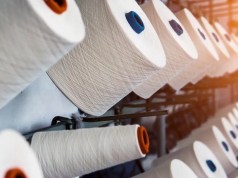Bangladesh needs to set a target and adopt a strategy to formalise waste collection to build an ecosystem to upstream circularity in the apparel and textile sector, experts have said.
The apparel industry annually produces about 400,000 tonnes of pre-consumer textile waste, which is collected in an informal way. However, there is an opportunity to earn $5-6 billion through recycling waste and producing apparel for export, they observed.
“Enabling a legal framework, Bangladesh needs to set some mandatory or legal framework for collecting waste to develop an ecosystem for industrial scale, as at this moment it is overwhelming in an informal way,” said M Masrur Reaz, chairman of Policy Exchange Bangladesh, at a dialogue, titled “Switch to Upstream Circularity Dialogue: Pre-consumer Textile Waste in Bangladesh, at a hotel in the capital yesterday.
The dialogue was organised under the Switch to Circular Economy Value Chains (SWITCH2CE) project, co-funded by the European Union and the Government of Finland.
A diverse group of stakeholders, including brands, manufacturers, policymakers, and financial institutions, were present.
Policy Exchange Bangladesh Chairman Masrur further said that there are vested interest groups involved with the existing way of waste collection, which is holding back a faster transition to circularity.
Citing the example of the Netherlands, he said, “The Dutch government have a full circularity transition plan for 2050, before that they have also intermediate plans for 2025 and 2030”.
“China also introduced a circular economy in their 11th five-year plan to roll out their vision”
Addressing as the chief guest, Saber Hossain Chowdhury, chair of the Parliamentary Standing Committee on the environment, forest and climate change ministry, termed waste management “challenging” and stressed policy support, fiscal incentives and up-cycling.
President of the BGMEA, Faruque Hassan said Bangladesh is one of the largest producers of textile scraps in the world, with around 400,000 tonnes of pre-consumer textile waste being produced annually, of which only 5% is recycled locally and over 35% is incinerated in boilers or landfilled.
He called for a waiver of the 7.5% and 15% VAT on local mills producing recycled fibre and yarn, and also on the duty on imported cotton waste, clips and mutilated garments, in a bid to ensure an adequate supply of raw materials to recycled fibre production mills.
Vice President of the BGMEA, Shahidullah Azim sought financial support from banks, saying if the opportunity is fully grabbed, $6-7 billion could be earned by exporting garments produced from recycled yarn and fabric.
Federica Marchionni, CEO of Global Fashion Agenda, said, “Bangladesh is poised to be the global leader in recycled materials, provided it effectively harnesses the potential of post-industrial waste.”
Nin Castle, chief programme officer and co-founder of Reverse Resources, said, “Increasing recycling capacity domestically represents an opportunity for substantial economic growth for the Bangladesh garment sector.
Dr Bernd Spanier, deputy head of Mission, Delegation of the European Union to Bangladesh, and Alexander Granberg, senior project specialist at Bestseller, also spoke.
















